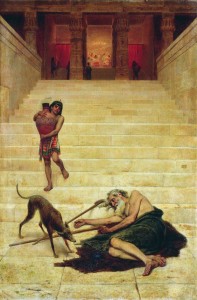Thoughts on Today’s Lessons for Sept. 25, 2016
First Reading: Jeremiah 32:1-3a, 6-15Imagine yourself in a terrible situation of war and destruction, with enemies rounding you up with your family and friends. They’re destroying your city and your temple and preparing to transport you all to a distant city where you must live in exile among people who do not even worship as you do. Wouldn’t going down to the real estate agent to buy an agricultural field be just about the last thing you would do? Who would plow it, plant it, guard it, harvest it? But Jeremiah uses just this image as the people face exile, a powerful and visible sign that they will return home some day. Look up the rest of this chapter, and you’ll find beautiful Scriptural assurance that God remains faithful even in the worst of times.
First Reading (Track Two): Amos 6:1a, 4-7
Today’s readings hammer home a powerful message: The bible does not go easily on the rich! The Old Testament prophets consistently preached against those who “trample on the needy and bring to ruin the poor of the land.” As we heard from Amos last week, those who broke their covenant with God through failing to be just and righteous would not fare well. Today Amos warns that the idle rich – with emphasis on the “idle” – will be the first to go into exile when their greed comes home to roost. Amos is outraged because the rich don’t care about “the ruin of Joseph,” the ordinary people of Israel. As Jesus will teach in the parable of Lazarus and the rich man, we are commanded to love and take care of our neighbors.
Today’s Psalm seems perfectly suited to today’s Jeremiah reading. It is also a favorite for reading in chaplaincy, eucharistic visits, and any time we pray with a sick or suffering family member or friend. It assures us of God’s protection and mercy. God is our refuge and our stronghold, our shield and buckler and protective wings, guarding us by day and by night, delivering us because we are bound to God in love.
Psalm (Track Two): Psalm 146
Today’s Psalm shouts out praise for God’s desire for justice for the oppressed, just as Amos had scorned Israel’s rich for failing to be just. Don’t trust rulers – the wealthy – who cannot help us and thus do not earn eternal life. Rather, we are called to follow the example of a God who feeds the hungry, sets prisoners free, heals the blind, and loves the righteous who offer justice to their neighbors. We hear all this again in the words of Jesus, who shows us the image of God in human form.
Second Reading: 1 Timothy 6:6-19
The rich are commanded to care for their neighbors, as the prophets preached and Jesus calls us to do. “You can’t take it with you,” the author of Timothy reminds us, setting out this ancient wisdom: “The love of money is the root of all evil.” It’s appropriate for all to want food and clothing, but we get in trouble when we’re tempted by more luxurious pleasures. Don’t count on your riches but on God, the author urges. Do good, be rich in good works, and share, and new life in God’s Kingdom awaits.
Gospel: Luke 16:19-31
This Gospel appears at first to be a simple story with a clear point: The selfish rich man would do nothing to help his neighbor Lazarus; not even offer him table scraps or shoo the dogs who licked at his sores. He ignores Torah’s command and the prophets’ warnings to be just. When he dies, he burns in fiery torment in Hades, while Lazarus enjoys an afterlife of comfort in Abraham’s arms. But as so often happens in the parables, Jesus leaves us questions to ponder. Considering how the rich man treated Lazarus in life, why would he expect Lazarus to help him now? More mysteriously, why can’t the rich man’s brothers be warned of his fate so they can avoid similar punishment? Do today’s readings shed any light on this?

